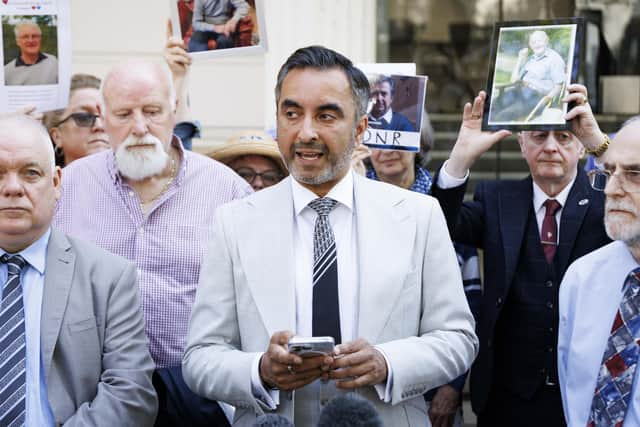The Covid inquiries give us hope for plain truths, not political narratives, about the devastating pandemic - Brian Wilson
There has always been something disturbing about claims by, or on behalf of, politicians to have had “a good pandemic” as exoneration of wider failings. A lot of this has been revived with the departures of Boris Johnson and Nicola Sturgeon.
Unsurprisingly, the greatest resistance to these accolades has come from bereaved families, many of whom question whether their loved ones would have died if governments had been better prepared, worked more closely together or made different decisions.
Advertisement
Hide AdAdvertisement
Hide AdThere are no demands for retribution, only an entirely reasonable insistence on answers. Conclusions which emerge through a judge-led inquiry are likely to be more reliable than any political narrative.


The statistics, laid bare at the start of the UK-wide public inquiry, provide a necessary perspective. Throughout the country, there were 220,000 Covid-related deaths with Scotland’s losses roughly proportionate.
Against that gloomy backdrop, any claims to inspired leadership need to be put on hold until evidence is tested. More important, lessons really must be learned about how a similar crisis would be dealt with in the future.
I can relate to that from personal experience. In early 2020, we were in Thailand when indications of something bad happening in Europe were emerging. There was temperature testing in hotels and shopping malls. The Thais performed very badly in the SARS crisis and were ready to prevent a repetition.
When we came back to the UK, there was nothing to suggest a problem. Indeed, it was the same week the notorious Nike conference in Edinburgh yielded the UK’s first Covid outbreak and the public was not even told.
The UK’s record divided into three stages - preparation, epidemic and vaccine. Opening statements to the inquiry made clear there will be a great deal of emphasis on the first. Why were we so ill-prepared to the point where protective equipment was bought at haste and colossal expense from around the world?
In a Scottish context, the Auditor General found in 2021: “Scotland took part in three pandemic preparedness exercises in the years before the outbreak but not all actions identified were fully implemented. These included measures to ensure access to enough PPE and to quickly address social care capacity, both of which became significant during the first wave of Covid-19.”
It is unfortunate the Scottish inquiry is not yet up and running and it remains to be seen how Scottish specifics will be dealt with by the proceedings led by Lady Hallett. Regardless, the expectation of bereaved families is for a full account of how devolved responsibilities, as well as UK-wide ones, were exercised.
Advertisement
Hide AdAdvertisement
Hide AdIn particular, the decision-making around care homes must be accounted for. My own unease about too much political control over the Scottish Government’s Covid response was encapsulated in an exchange between Nicola Sturgeon and Neil Findlay, then a Labour MSP, who in May 2020 asked: “Why on earth are we continuing to discharge patients from hospitals to care homes without establishing whether they are positive for
Covid-19? Please stop that practice now to save the lives of residents and the great people who look after them.”
It turned out to be worse. Patients who had tested positive, it transpired, were sent to care homes. Instead of promising an urgent review, Ms Sturgeon replied: “Please do not ask such questions in a way that suggests we are not all trying to do everything that we possibly can in order to do the
right thing.”
Mr Findlay found himself on the receiving end of social media abuse for a “suggestion” he never made. At that early stage, the politics of control seemed to have transcended the humility of listening. Almost half the Scottish deaths took place in care homes and answers will continue to be
required here, just as in the rest of the UK.
The lawyer for Scotland’s bereaved families, Aamer Anwar, rightly insists that Lord Brailsford, chair of the Scottish Covid-19 inquiry, must have access to all private communications among key players relating to the pandemic. It is, as he says, for the judge rather than Ministers to decide what is relevant. Quite a lot, I suspect, particularly in relation to presentation and differentiation.
I heard the journalist who broke the story about Downing Street parties being asked this week if she ever expected it to generate the consequences
which followed. No, she said, she had thought of it initially as a “Westminster bubble” story rather than one which would ignite fury throughout the land about law-makers breaking rules which lesser mortals respected, at great personal cost.
The news cycle moves on and the events of 2020 now seem distant to most of us. For the families and friends of many who died, it is still a tragedy
Advertisement
Hide AdAdvertisement
Hide Adwhich runs deep and needs to be explained. Where appropriate, it should be apologised for and certainly learned from in every detail.
By late 2020, the UK was near the bottom of the European league table for additional deaths. Then the first vaccine was approved and the tide was turned. Its roll-out was a masterclass in good government and it is maybe ironic that the politician in charge of it, Nadhim Zahawi, has been consigned to outer darkness, for entirely unrelated reasons. All political careers do indeed end in failure.
Then again, the real heroes of that epic story were those who toiled to produce a world-changing result within an astonishingly short timescale.
When the time eventually comes to report on these two years when Covid-19 shook our society, the headlines will probably be about what went wrong
and who was responsible. The parallel narrative of what went right should not be forgotten.
The politicians may be gone in varying degrees of disarray but the scientists are still quietly going about their work. For that we should be thankful.
